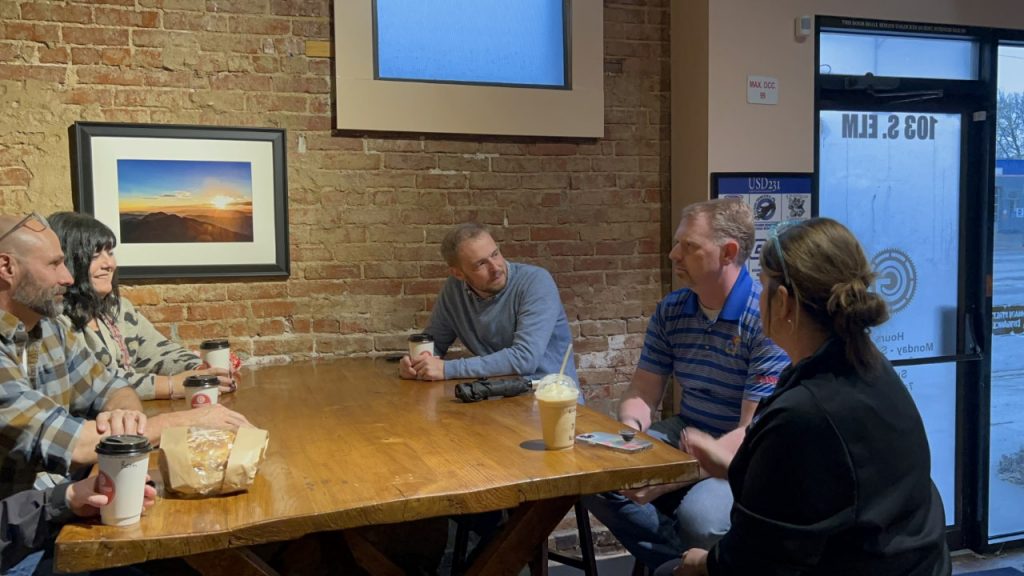Kansas District 43 Candidate meets with City Council members

Keith Davenport is running for the District 43 representative position in the State of Kansas against 10 year incumbent Bill Sutton.
Every Friday for the last few months he has held chats with constituents at Groundhouse Coffee on Main Street.
This last Friday, November 4 he held his last one before the mid-term election on Tuesday, November 8.
He, also, hosted special guests current Gardner City Council members Tory Roberts and Mark Wiehn.
Davenport said key areas that needed addressed for the community were funding special education, child care, cost of living and economic development opportunities.
When it came to special education funding, he said the money was there, and when special education isn’t funded school districts have to take money of the General Education Fund.
“Every classroom, student and teacher is impacted by that,” he said.
Davenport said the tax revenue at the State level proceeded projections.
“There is no reason why we are not funding special education,” he said. “A tax credit is great but it would be nice to put it up front.”
Davenport said not being able to assist with childcare costs makes it a hard time to fill entry level positions and they could do more with private public partnerships.
One major area of focus, he said was the cost of living and inflation for property owners, home owners and purchasing food.
“I went to the grocery store and said to myself, so I pick the gallon of milk that is $5.03 or $5.43 and went on my goodness I have four kids.,” he said. “That is $15 a week in milk. Eliminating the food sales tax right away would go a long way.”
Davenport said unleashing economic development opportunities and giving local government control back to local city councils and school boards would go a long way.
A constituent in attendance said they would like to know what Davenport would do to incentivize small businesses because they had grown up on a dairy farm that had been swallowed up by so many regulations that they couldn’t pay for all the requirements.
They said how would Davenport reduce the tax codes, so everyone was on the same level playing field.
Davenport said he is idealistic, and the rhetoric tends to go proregulation or deregulation and his approach would be for balance.
“There have to be some for safety reasons,” he said. “But some are all for corporations to monopolize the market because they are so burdensome. I would get rid of the ones that are pay to play.”
Davenport said he would like to read every bill before he votes and wants people to have a seat at the table— the stakeholders.
“I would like to meet with experts In the fields and not be making decisions in areas I don’t know without feedback,” he said. Davenport said the other concern was small businesses and the vacant buildings on Main Street.
“I want to put the power back to local governments and not tell Mark and Tory how to do development,” he said.
Davenport said it was important to keep small businesses in the community and explore more ESOPs, because it was important when an owner retired for the employees to keep their jobs in the community.
“54 percent of business owners in Kansas are over 55 years in age,” he said. “If we don’t have a good strategy in place, we will lose businesses in ten years.”
Tory Roberts, council member, said she was pro small business and downtown.
“I am worried it is just a pass through and it needs to be a destination,” she said.
Roberts used the snow removal service as an example.
“We set precedent and decided after 20 years we were not going to do it anymore,” she said. “I don’t think that is being a good partner.”
Roberts said she would look for more opportunities and being creative, even if that is doing things differently then what has been done before.
“I want people that live here to stay here,” she said. “Anything to do to keep in Gardner. We need a destination down here.”
Steve Stine, Groundhouse Coffee owner, said he had had conversations with city staff about Main Street’s construction project and their views were there wasn’t a good relationship with KDOT.
“Which is pretty self-evident,” he said. “Everyone agrees the project is taking too long.”
Stines said he would like Davenport to repair the city’s relationship with KDOT as they hadn’t had any intervention with State officials.
Everyone agreed that the Main Street construction project was hurting the downtown economic development for Gardner.
Davenport said it went back to the bad tax policy created by former Governor Sam Brownback.
“They pulled money out of KDOT,” he said. “$2 billion in the last 10 years went to fund everything and anything else.” Davenport said to get things done around the State it requires city and county governments to fork over cash.
“Cities like Gardner don’t have big budgets and don’t have precedent,” he said. “The back story of bad tax policy forced cities to come up with solutions and haven’t had long term relationships.”
Davenport said the State policies don’t fit well in Gardner.
Roberts said Main Street is a problem along with the Gardner Road/I-35 intersection and it is hard to get to businesses.
“We need to work together to have a solution, but the ones provided to us were not good for Gardner,” she said.
Wiehn said city funds need to be prioritized to work and boost the intersections but that might not be until 2026 or 2028.
“I’m concerned we will deprioritize Main Street and then it will be 2032,”he said. “I don’t know if we ca n wait that long.”
Stines said he attended redevelopment meetings.
“We are behind,” he said. Stines said designating downtown as a historical district will be helpful.
“There are things we can’t do to elevate, but until we have sentiment from city and state that downtown is important it’s going to be an issue,” he said.
Wiehn said they currently focus on making sure projects are self-supported and provide a tax base.
Stines said he thinks downtown could be on the precipice of something happening and the additions of the cigar bar and upcoming brewery will help attract other businesses.
“Business will take care of business,” he said. “What we need along the way is an environment that helps promote and doesn’t get in the way,” he said.
Stines said Gardner was the only downtown he knew of that doesn’t allow sandwich boards on the sidewalks.
“It’s all about the attitudes of officials,” he said.
Davenport said he believes in local governments having local control.
“I will never tell city council or school board how to do their job,” he said. “They are elected by the people, and I will advocate for local governments. I will make sure we are not pushing for things that hurt the community.”
Davenport said if he is elected he will stay active in the community through all communication channels of newsletters, phone calls, emails and social media. He said he would also like to host town halls.
Davenport said voting is important and not only was a lower turnout expected for this year’s mid-terms, but District 43 typically has a lower turn out than the other areas of the county.
“We haven’t had anyone locally communicate,” he said. “You’re most likely to vote in the next election because you know what’s going on.”
Davenport said what party a person belongs to matters less than what community they belong to.
“What community you belong to matters more in our day to day lives,” he said. “We all drive down Main Street and have challenges with the school district, as business owners etc. and none of it is dependent on party affiliation.”
Davenport said the area has real practical problems with practical solutions that everyone can work together to solve.
“My biggest theme has been connecting with voters,” he said. “The community for a long time has t really had someone advocating for them in Topeka.”

